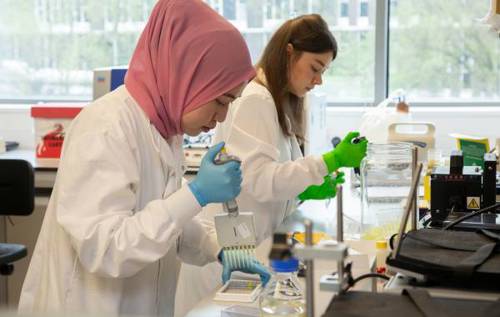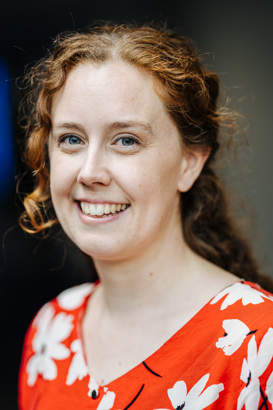Our Career Development Fellows and their research on fibromyalgia, osteoarthritis and JIA
29 September 2023
Imagine a world where arthritis is preventable, manageable and treatable. That’s what our research hopes to achieve.
To make these breakthroughs a reality, we need to support the next generation of talented researchers – and that’s why we created the Career Development Fellowship.
Want to know what it’s all about? Here we look at the Fellowship, our researchers, and their incredible work on osteoarthritis (OA), fibromyalgia and juvenile idiopathic arthritis (JIA).
What is a Career Development Fellowship?
 As part of our Research Strategy, we want to support future research leaders.
As part of our Research Strategy, we want to support future research leaders.
Not only will this help them take the next step in their careers, but it also gives them the support they need to make more ground-breaking discoveries.
Our Career Development Fellowships provide researchers with up to £750,000 in funding for five years. This can cover the costs of hiring additional research staff, for example, a PhD student, or a technician who can support the Fellows’ research.
These awards are open to scientists, medics, vets, nurses, and allied health professionals who are dedicated to arthritis research.
“The fellowship provides essential resources, support, and mentorship to expand my research network and collaborations," says Dr Erika Kague, the University of Edinburgh.
Fellowships
Who are our new Career Development Fellows at Versus Arthritis?
We’re so excited to introduce you to our latest Career Development Fellows:
- Dr Lianne Kearsley-Fleet, the University of Manchester.
- Dr Erika Kague, the University of Edinburgh.
- Dr Jim Dunham, the University of Bristol.
Lianne aims to fill the gap in knowledge regarding long-term health-related outcomes in adults with juvenile idiopathic arthritis (JIA). Jim aims to improve treatment for people with fibromyalgia. And Erika wants to improve our knowledge of the underlying causes of osteoarthritis using zebrafish!
Researching osteoarthritis, fibromyalgia and juvenile idiopathic arthritis
Want to get a sneak peek at what our researchers are up to? Take an in-depth look at Lianne, Erika and Jim’s research into these long-term conditions.
Planning for a future without fear: Studying the long-term health of people with JIA
Dr Lianne Kearsley-Fleet at the University of Manchester

What does the future look like for young people with JIA? This is what Lianne wants to explore through her research.
Lianne is an experienced data scientist at the Centre for Epidemiology Versus Arthritis.
By delving into the data, Lianne wants to answer important questions such as:
- How many young people will continue to have arthritis as adults?
- How many children with JIA continued to have arthritis, or need treatment, as adults?
- What's the impact on their quality of life, mental health and ability to have children?
- How often do complications of JIA and its treatment happen?
“Currently, lack of information on what happens to children and young people with JIA as they become adults is a major source of anxiety for patients and their families. Therefore, by establishing high-quality up-to-date information, we can immediately start to inform patients and families, as well as health-care professionals, on what to expect, so they can prepare for the future”
Studying nerve pain activity for better diagnosis and treatment of fibromyalgia
Dr Jim Dunham at the University of Bristol
 Fibromyalgia is a long-term condition that causes pain and tenderness all over your body. It can be difficult to diagnose, and we currently don’t know what causes it.
Fibromyalgia is a long-term condition that causes pain and tenderness all over your body. It can be difficult to diagnose, and we currently don’t know what causes it.
One theory is that people who have fibromyalgia might have overactive ‘pain nerves’ (sometimes called nociceptors). These nerves connect the skin, joints and internal organs to the spinal cord and brain.
Nociceptors signal to the brain if they detect damage to your body. Importantly, in health they are usually quiet, like a guard keeping watch. They only activate when damage occurs. If they are overactive in patients with fibromyalgia, this could explain why they have pain.
Jim wants to look closer at these nerves and develop a tool to track their activity. He hopes this will help us better diagnose and treat fibromyalgia in the future.
This fellowship should enable us to understand why a person has chronic pain. Is their pain generated in their peripheral nociceptors, or from their central nervous system? Understanding where the pain is coming from will allow us to tailor current medications better”
Studying the role of bone cells in the development of osteoarthritis
Dr Erika Kague at the University of Edinburgh
 When developing medicines for osteoarthritis which cells should we target?
When developing medicines for osteoarthritis which cells should we target?
Erika hopes to find the answer by studying osteocytes, one of the most common cells in our skeleton, that are important in maintaining the health of the bone.
Erika is a geneticist who has been interested in bone biology for a long time.
She’s also passionate about zebrafish. This fish has roughly 70% of the same genes as humans and could help us better understand human health conditions.
Using her strong molecular, genetic, and developmental biology skills, Erika will look closely at bones, cartilage, and neurons to study the progression of osteoarthritis.